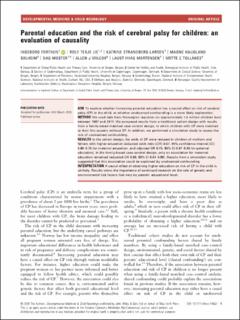Parental education and the risk of cerebral palsy for children: an evaluation of causality
Forthun, Ingeborg; Lie, Rolv T.; Strandberg-Larsen, Katrine; Haugland Solheim, Magne; Moster, Dag; Wilcox, Allen J.; Mortensen, Laust; Tollånes, Mette Christophersen
Journal article, Peer reviewed
Published version

Åpne
Permanent lenke
https://hdl.handle.net/11250/2731682Utgivelsesdato
2020Metadata
Vis full innførselSamlinger
Originalversjon
Developmental Medicine & Child Neurology. 2020, 62 (10), 1176-1181 10.1111/dmcn.14552Sammendrag
Aim
To explore whether increasing parental education has a causal effect on risk of cerebral palsy (CP) in the child, or whether unobserved confounding is a more likely explanation.
Method
We used data from Norwegian registries on approximately 1.5 million children born between 1967 and 2011. We compared results from a traditional cohort design with results from a family‐based matched case–control design, in which children with CP were matched to their first cousins without CP. In addition, we performed a simulation study to assess the role of unobserved confounding.
Results
In the cohort design, the odds of CP were reduced in children of mothers and fathers with higher education (adjusted odds ratio [OR] 0.67, 95% confidence interval [CI] 0.60–0.75 for maternal education, and adjusted OR 0.75, 95% CI 0.67–0.85 for paternal education). In the family‐based case–control design, only an association for maternal education remained (adjusted OR 0.80, 95% CI 0.64–0.99). Results from a simulation study suggested that this association could be explained by unobserved confounding.
Interpretation
A causal effect of obtaining higher education on risk of CP in the child is unlikely. Results stress the importance of continued research on the role of genetic and environmental risk factors that vary by parents’ educational level.
